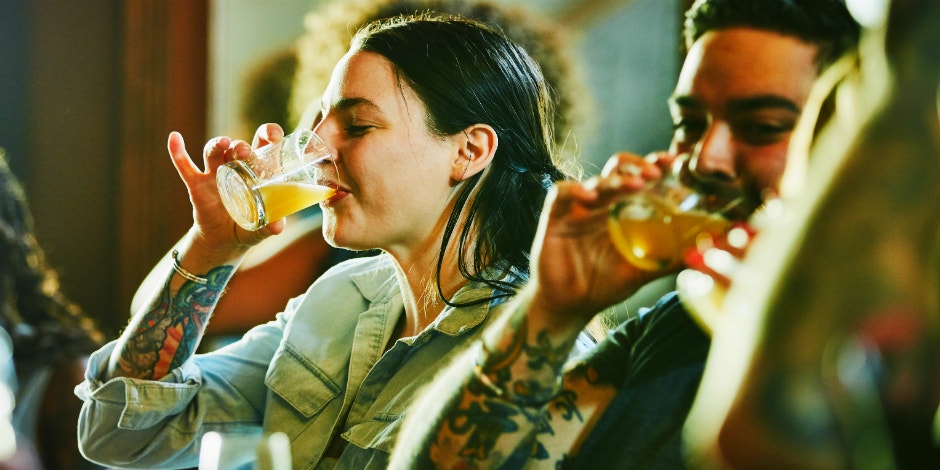10 Early Signs Of Alcoholism You Should Never, Ever Ignore
Here are some early warning signs of alcohol troubles.
 Getty Images
Getty Images If all warning signs came with gigantic flashing lights, they might be more effective. But the trouble with warning signs is that we often don’t recognize them at the time we most need to. With something like addiction that takes some time to develop, we may already be steps down the path before we realize we’re even on it.
For a variety of reasons, people may start to wonder about their alcohol consumption or other potentially addictive behaviors. Regrets and recriminations often fuel this question. Those may provide an opportunity to take stock.
The following early signs of alcoholism are a starting point for exploration.
They may seem familiar or even somewhat benign or insignificant. However, if they become more common and routine over a period of time, they warrant further attention
This list is by no means exhaustive. (Also, though geared toward alcohol consumption, these warning signs can be amended for other addictive substances and behaviors.)
Here are 10 early signs of alcoholism you should never ignore:
1. You find yourself organizing your social life around drinking.
This can take various forms: You might find yourself wanting to spend more time with people who like to drink, rather than with friends who don’t. You might also find yourself wanting to stay home alone drinking instead of going out with friends. Staying at home may even provide a justification for more drinking because you don’t have to worry about drinking and driving.
2. You start to have a few drinks before you go out with friends.
College students call this “pre-gaming.” The idea is to get a head start as a way to loosen up or save money. You may tell yourself that a bottle of wine only costs $10, which is cheaper than buying two drinks at $8 each, but while you might intend to have only one drink out, you may still have that second.
3. You may start counting your drinks using “alternative math.”
You might not "count" the drinks you had before you went out, because that was hours ago, or you have eaten since then and theoretically countered the effects of the alcohol. When you start creating a formula to figure out how much you are drinking or to get the answer or number you want, that is something to take seriously.
4. You begin to define “drink” differently.
Alcoholic drinks are not all created equal when it comes to alcohol content. You may decide that wine, for example, isn’t a "real" drink like vodka, and then tell yourself that only “real" drinks count. You may decide to give up the hard "real" liquor and replace it with the lighter stuff. But if you increase your consumption of that lighter stuff, the results could be the same.
5. You worry about running out of alcohol.
If you live in a state with laws prohibiting the sale of alcohol on Sunday, Saturday night may become a concern. If the weather is bad, you might tell yourself to buy some extra “just in case.” You may also decide to finish your open bottle because you know you’ll be buying more, so you might as well get it out of the way.
6. You are stunned when someone puts the cork/top back on an unfinished bottle.
You may even think, "Who knew that was an option?!” You may also be surprised when someone doesn’t finish “a perfectly good drink,” because that is a waste of good alcohol.
7. You get annoyed by how slowly other people drink.
You may find yourself wishing other people would hurry up and finish their drinks so that you can get another. No one wants to stand out by obviously and overtly drinking more than others.
Ordering “another round” or filling the others' wine glasses gives the appearance that people are socially drinking the same amounts in the same way, so that you can hide in plain sight. You might also get annoyed when friends “have had enough” and want to go home before you think you’ve had enough.
8. You look at photos and notice you always have a glass in your hand.
While it is true that a photo captures only a particular moment, enough of those moments can be deeply revealing. You may start to notice that you look more intoxicated than others, or that you all look rather intoxicated. You may even notice that your face and the rest of your body look different from how you think it looks or how you remember it looking.
9. You worry about your recycling or garbage bin.
Bottles tend to rattle around and make what seems an enormous amount of noise that would "out" you to your family or neighbors. As a result, you may hide bottles and dispose of them after the bins are out for pick up. You may dispose of them at a gas station, in a neighbor’s bin, or wherever there is an unlocked dumpster not under surveillance.
10. You meet people in recovery and see something in them that you want.
It may be someone with whom you used to drink. It may be a total stranger. You may start to hear your drinking patterns in their stories. You may also discover that they drank for similar reasons or for very different ones. They may suffer consequences similar to yours, or they may have suffered much worse. But you do see that they are living a life in recovery that is making them happy, and you start to want that for yourself.
Peg O'Connor, Ph.D., is a professor of philosophy and gender, women, and sexuality at Gustavus Adolphus College, and the author of Life on the Rocks: Finding Meaning in Addiction and Recovery.
YourTango may earn an affiliate commission if you buy something through links featured in this article.

